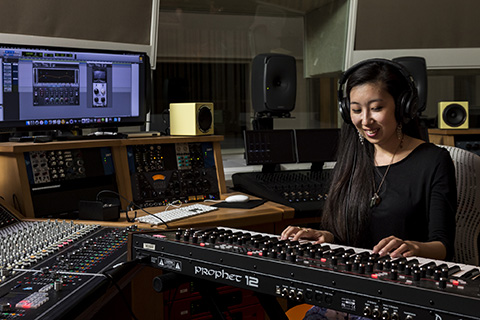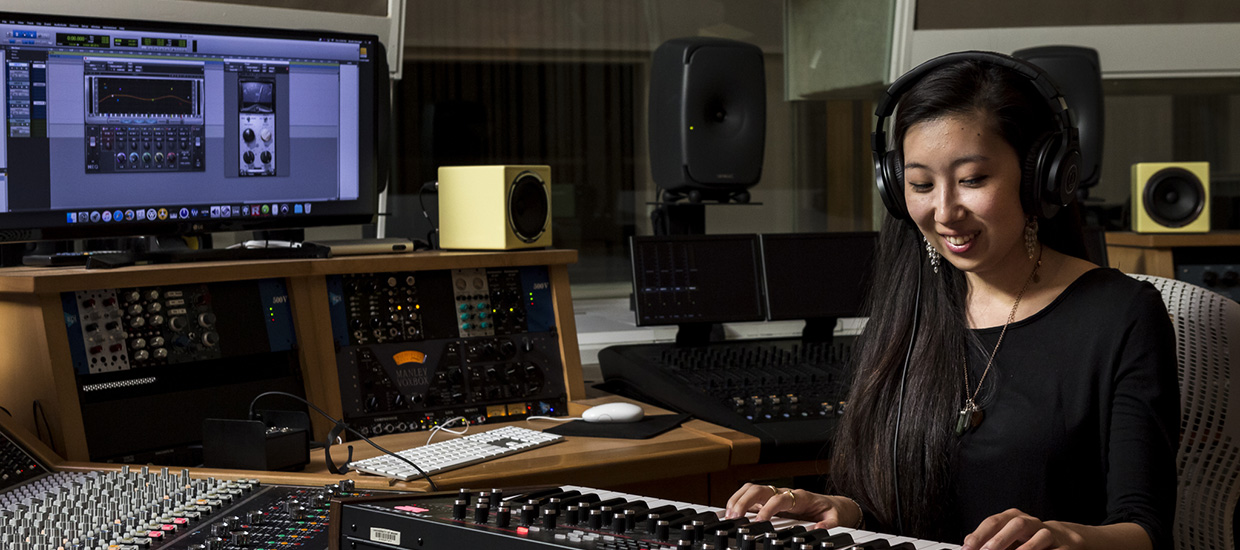If you are interested in creating sound for some of today’s top media, a Music Engineering program is for you. Music Engineers and sound designers work behind the scenes and around the world, playing a key role in many films, video games, and theaters. Sound designers add sound to make a production more believable and realistic, creating a more enjoyable experience for everyone.
What is Sound Design?
Sound design happens when someone creates sound professionally, often for a film, television show, radio, commercial, or other multimedia need. Sound design differs from composition in a key way: while composition is the creation of sound for the purposes of playing a musical song, sound design can be applied to a wider variety of contexts. Sound designers have used not only every kind of instrument out there, but musical software and regular household objects for their sound as well.
A Short History of Sound Design and Sound Designers
Sound design programs have grown alongside the advent of new entertainment technologies. For hundreds of years, sound was created off-stage to add to the audience experience of theatrical productions. In the early days of radio, sound designers used a variety of implements to create sounds that would enhance the production. Film began as a silent genre, but when movie production advanced to the “talkies,” sound designers became an integral part of Hollywood. These days, Foley sound designers work as specialists who use common household objects (like leather gloves or cornstarch) to create realistic, common sounds for movies and television. If you’re consuming a major multimedia production, it’s likely that it was produced with the help of a sound designer.
How Do I Know If Music Engineering is the Right Career Path for Me?
Music Engineering programs encourage students to understand nuance as well as whether a sound is realistic and appropriate. The appropriate music or sounds for different situations will also be different. Practicing creative and detail-oriented skills will help you prepare for a career in sound production. All musicians need to be able to key into pitch and tone, but music engineers must have the ability to judge the world’s more unusual sounds. What is the sound of a newspaper hitting cement? Does the music match the emotional moment in a television episode? Critical thinking is an essential skill for any sound designer.
Job Outlook Predictions in the World of Music Engineering
One of the brightest aspects of a career is the variety of opportunities. Sound designers work for film studios, radio stations, and in television production and theatre. From Hollywood to Broadway to Miami, sound designers are working in major cities across the country, creating the sounds that we hear everyday. Some sound designers even run their own independent studios. What you do as a sound designer all depends on your unique interests.
Top Five Characteristics of The World’s Best Sound Design Programs
Before you apply to any program, it’s in your interest to do your homework. You want to make sure that the school is a place you can see yourself thriving in. The following list includes some of the top considerations you should think about before you begin to apply:
1. Hands-on Experience in Music Engineering
- The technology, tools, and studio time that you gain in college will put you at a great advantage once you enter the job market. Make sure that the school you’re applying to has a fully-equipped sound design studio so that when you leave the school, you’ll be well-prepared for any sound design job prospect.
2. Classes and Opportunities that Match Your Goals
- Not every music school offers classes or a concentration in sound design. Some students have made the mistake of finding themselves at a school that doesn’t even have the classes they need. Schools are happy to provide a course catalogue and list of majors. Take your time perusing these materials to ensure that the school meets your needs.
3. A Classroom Atmosphere that Works for You
- Studies have shown that small class sizes are the best ways for us to learn. Hands-on opportunities and small group conversations enable our brains to work in ways that listening to a lecture simply doesn’t. Ask the school you’re applying to about their typical class size.
4. Networks Connected to the Music Engineering Industry
- Do the instructors at your school have connections to professionals in the sound design industry? Have alumni landed successful sound design jobs and internships? Sound design programs are not created equally: some programs have far more industry connections than others.
5. Proximity to Off-Campus Connections
- When you attend a school in a major metropolitan area, along with the school comes a wide variety of off-campus connections. An important consideration for you as a prospective student is whether the location of the school offers the kinds of opportunities you seek. Make sure to investigate sound design opportunities in the area. Does the city contain music studios? Does film production happen there? Make sure to do your homework.
What Do I Need to Know Before Applying to a Program in Music Engineering?
Any prior experience related to sound, music, theater, or related fields will strengthen your application. While you don’t need to have extensive experience already in music engineering specifically (you are going to school to pursue this field for the future, after all), you will need to show the school that you have both interest and potential.
Finding a Sound Design Program That is the Right Fit For You
The Frost School of Music at the University of Miami uses the distinctive Frost Method™, a mode of teaching that incorporates individual learning from both the instructor and from a driven cohort of peer musicians. At The Frost School, you will enter an established program where you dreams for sound design can flourish. With a prime location, excellent pool of successful alumni, and distinguished instructors, The Frost School helps you pursue your sound design career.





